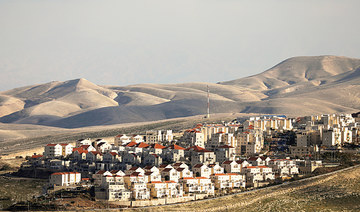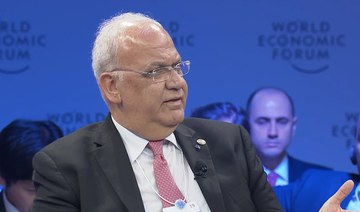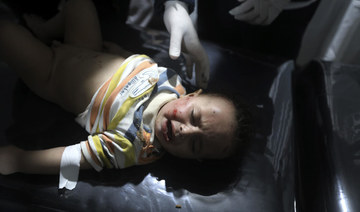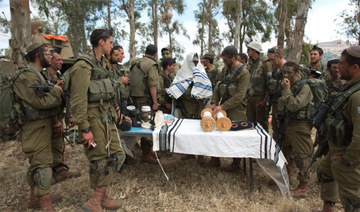JERUSALEM: Israeli Prime Minister Benjamin Netanyahu sought to energise supporters on the eve of Tuesday’s elections with warnings and controversial promises, while his centrist challenger urged voters to tell the premier the country has had enough.
The general election — in which Netanyahu is seeking to extend his 13 years in office despite corruption allegations against him — is expected to be close, as ex-military chief Benny Gantz poses a serious challenge.
The two men spent the campaign’s final hours exhorting voters with two different strategies: Netanyahu repeatedly warned that his Likud was at risk of losing, while Gantz made the case that Israel was on the verge of historic change.
The truth was more complicated, with opinion polls giving Netanyahu’s Likud and Gantz’s Blue and White a similar number of seats in the 120-seat parliament.
Under those polls, both would fall far short of an outright majority and would need to pull together a coalition.
If polling trends hold, Netanyahu would be best placed to build an alliance thanks to smaller right-wing parties close to him.
But there have been repeated warnings about opinion polls’ historical unreliability and the fact that many voters say they remain undecided.
Netanyahu’s claims that Likud may lose were widely seen as a way to encourage his base to turn out.
Netanyahu has made last-minute appeals to the right, issuing a deeply controversial pledge to annex settlements in the occupied West Bank.
If done on a large-scale, applying Israeli sovereignty there could extinguish remaining hopes for a two-state solution with the Palestinians.
In an interview on Sunday, Netanyahu said US President Donald Trump, who is expected to release his long-awaited deal for Israeli-Palestinian peace sometime after the election, was aware of his plans.
Netanyahu said he planned to apply sovereignty gradually, and that he did not differentiate between Israel’s large West Bank settlement blocs and the isolated ones located deep in the territory on land the Palestinians see as part of a future state.
“Who else can do this? Who can do this? Come on. Honestly,” Netanyahu said, making the case as he has throughout the campaign that he is Israel’s essential statesman.
“Who can stand in front of the world? Who can stand in front of the American Congress? Who can move public opinion in that direction?“
Gantz has called Netanyahu’s pledge an “irresponsible” bid for right-wing votes.
He says he favors a “globally backed peace agreement” that sees Israel hold on to the large settlement blocs in the West Bank and maintain security control over the territory.
Gantz has also highlighted his security credentials while saying he will heal divisions he accuses Netanyahu of exacerbating.
“There’s a need for change and an opportunity for change,” Gantz told Israel’s army radio on Monday.
“Israel needs to choose a direction of unification, connection and hope — or of extremity.”
The two were also engaging in typical pre-election campaigning, including Gantz riding a motorcycle to his rally on Sunday and Netanyahu visiting Jerusalem’s main market on Monday.
“The only way to close the gap and to ensure that Likud will form the next government for sure is to have a big Likud,” Netanyahu told supporters at the market.
Gantz said Monday at his party headquarters in Tel Aviv that supporters had to make sure “everyone goes to the polling stations because we are going to serve all voters from the right and from the left, all of the Israeli citizens.”
Netanyahu will be on track to surpass founding father David Ben-Gurion as Israel’s longest-serving prime minister should he win on Tuesday.
But even if he triumphs, he faces the prospect of becoming the first sitting prime minister to be indicted.
The attorney general has announced he intends to indict Netanyahu for bribery, fraud and breach of trust pending an upcoming hearing.
The premier’s opponents have seized on the allegations to argue that the 69-year-old Netanyahu has lost his way and must go.
But the premier has been defiant, calling the investigations a “witch hunt” and denouncing journalists reporting on them — similar to the tactics used by his ally Trump.
While the threat of indictment hangs over Netanyahu, he has also built a reputation as guarantor of Israel’s security and economic growth.
He has repeatedly claimed Trump’s recognition of the disputed city of Jerusalem as Israel’s capital and Israel’s sovereignty over the Golan Heights as two of his major accomplishments.
Gantz has sought to overcome that in part by allying with two other former military chiefs of staff and ex-finance minister Yair Lapid.
Netanyahu, Gantz make final pitches before Israeli vote
Netanyahu, Gantz make final pitches before Israeli vote
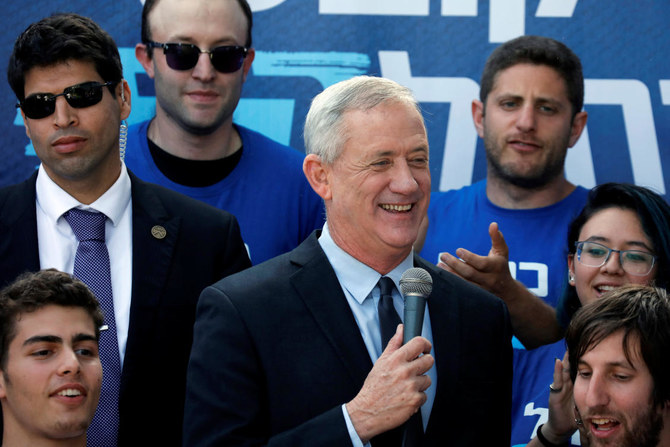
- The general election — in which Netanyahu is seeking to extend his 13 years in office — is expected to be close, as ex-military chief Benny Gantz poses a serious challenge
- Netanyahu has made last-minute appeals to the right, issuing a deeply controversial pledge to annex settlements in the occupied West Bank
Egypt, Dutch leaders discuss Gaza ceasefire efforts

- Rafah assault ‘will have catastrophic consequences on regional peace and security,’ El-Sisi warns
- Egypt’s president and the Dutch prime minister agreed on the urgency of working toward reaching a ceasefire
CAIRO: Egypt’s President Abdel Fattah El-Sisi has discussed efforts to reach a ceasefire in Gaza with Mark Rutte, prime minister of the Netherlands.
During a phone call from Rutte on Thursday, the Egyptian leader warned that any Israeli assault on Rafah will have “catastrophic consequences” for the humanitarian situation in the enclave.
The leaders discussed bilateral relations, and ways to enhance cooperation across various political and economic levels consistent with the current momentum in Egyptian-European relations.
Ahmed Fahmy, presidential spokesman, said the call also focused on the situation in Gaza, and Egypt’s efforts to restore regional stability by reaching a ceasefire and providing access to humanitarian aid.
El-Sisi reiterated the crucial importance of ending the war, warning against any military operations in the Palestinian city of Rafah, which will have catastrophic consequences on the humanitarian situation in the strip and on regional peace and security.
The Egyptian leader underscored the need for the international community to assume its responsibilities to implement the relevant UN resolutions.
Egypt’s president and the Dutch prime minister agreed on the urgency of working toward reaching a ceasefire, and ensuring the flow of adequate humanitarian aid to all areas of the Gaza Strip in order to protect it from a humanitarian catastrophe.
They also emphasized the need to move toward implementing the two-state solution, which would restore regional stability, and establish security and peace in the region.
In March, El-Sisi received Rutte to discuss bilateral relations, regional developments, and Egypt’s efforts to reach a ceasefire and offer humanitarian assistance in Gaza.
Lebanon postpones local elections again as violence rocks south

- Lebanon is supposed to hold municipal elections every six years
- Parliament approved “extending the existing municipal and elective councils’ mandate until a date no later than May 31, 2025,” despite objections from lawmakers opposed to Hezbollah
BEIRUT: Lebanon’s parliament on Thursday delayed municipal elections for a third time in two years, state media reported, as militants in the country’s south exchanged near-daily fire with Israel for over six months.
The powerful Iran-backed Hezbollah group has been trading fire with Israeli forces across the border since the day after its Palestinian ally Hamas carried out a deadly attack on Israel on October 7, triggering the ongoing war in the Gaza Strip.
Lebanon is supposed to hold municipal elections every six years, but cash-strapped authorities last held a local ballot in 2016.
Parliament approved “extending the existing municipal and elective councils’ mandate until a date no later than May 31, 2025,” despite objections from lawmakers opposed to Hezbollah, said the official National News Agency.
The bill cited “complex security, military and political circumstances following the Israeli aggression on Lebanon” and especially its south, near the border, as reasons for the delay.
Lawmakers did not set a new date for the elections, initially scheduled for 2022.
Local councils help provide basic services to residents, but their role has declined as state coffers ran dry after Lebanon’s economy collapsed in late 2019.
Parliament Speaker Nabih Berri had previously said southern Lebanon could not be excluded from any upcoming ballot, after the Christian Lebanese Forces, the main party opposing Hezbollah, insisted on holding the polls on time.
More than 92,000 people have been displaced from their homes in Lebanon due to the violence, as have tens of thousands of residents of Israeli communities across the border.
Since violence began along the Israeli border on October 8, at least 380 people have been killed in Lebanon, including 72 civilians, according to an AFP tally.
Israel says 11 soldiers and eight civilians have been killed on its side of the border.
In April 2023, the Lebanese parliament had already postponed municipal elections as the deputy speaker warned holding them was “almost impossible” for the cash-strapped country after years of economic meltdown.
Lebanon has faced the prolonged financial crisis and months of border clashes essentially leaderless, without a president and headed by a caretaker government with limited powers amid deadlock between entrenched political barons.
Palestinian officials say Israeli forces kill teen in West Bank
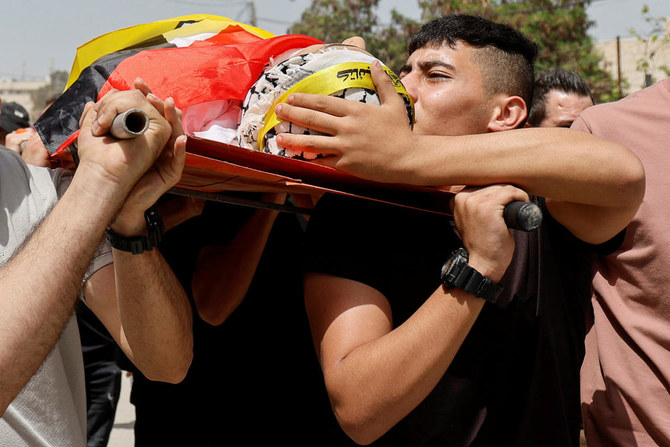
- Israeli police said “hits were identified” when forces responded to stone-throwing with gunfire
- The Palestinian health ministry said Khaled Raed Arouq was shot in the chest and “martyred by the occupation’s live bullets“
RAMALLAH, Palestinian Territories: Palestinian officials said Israeli forces killed a 16-year-old boy during a raid in the West Bank city of Ramallah early on Thursday.
Israeli police said “hits were identified” when forces responded to stone-throwing with gunfire but did not directly address the allegation.
The Palestinian health ministry said Khaled Raed Arouq was shot in the chest and “martyred by the occupation’s live bullets.”
Palestinian official news agency Wafa said Arouq died after being “shot by Israeli gunfire” early on Thursday morning.
Israeli forces carry out regular raids on towns and cities in the occupied West Bank and violence has soared in the Palestinian territory since the war in Gaza broke out on October 7.
Wafa said Israeli military vehicles stormed the city and “confrontations broke out between citizens and the occupation forces, who fired live bullets and stun grenades.”
It said Israeli forces were stationed in several neighborhoods and raided a house in Al-Bireh to the northeast.
Israeli police said: “Terrorists threw stones at the forces operating in the area, the forces responded with gunfire, and hits were identified.”
The police said they made several arrests and that Israeli forces did not suffer any casualties.
The army did not immediately respond to AFP’s request for comment.
Later on, Thursday, mourners carried Arouq’s body wrapped in the flag of Fatah, the political party of Palestinian president Mahmud Abbas, in his hometown of Jenin where he was buried.
“He was hit by a bullet in his back, which exited through his chest...They assassinated him in cold blood,” Majed Arqawi, cousin of Arouq, told AFP.
Wafa said Arouq’s father was an officer in the Palestinian military intelligence service.
Israel has occupied the West Bank since 1967 and at least 488 Palestinians have been killed by Israeli troops or settlers there since October 7, according to Palestinian officials.
At least 19 Israelis have been killed in attacks by Palestinians in the same period, according to official Israeli figures.
Hezbollah denies Israel claim it killed half of commanders in south
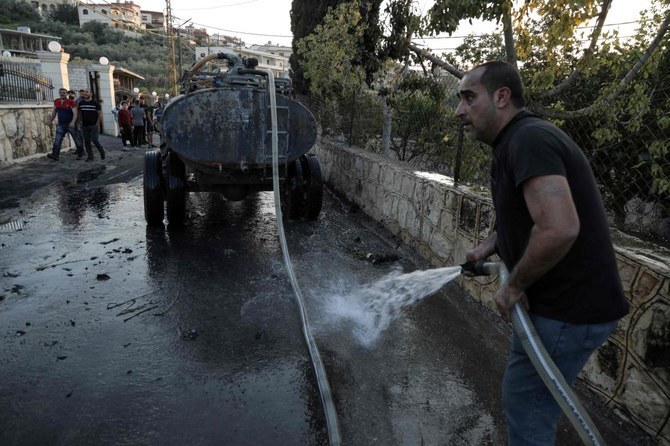
- The number of slain Hezbollah members who “hold a certain level of responsibility does not exceed the number of fingers on one hand“
- Gallant’s claim was “untrue and baseless”
BEIRUT: Hezbollah denied on Thursday an Israeli claim that it had killed half of the Iran-backed Lebanese group’s commanders in the south of the country, saying only a handful were slain.
The Lebanese group has been exchanging near-daily fire with the Israeli army since the day after its Palestinian ally Hamas carried out an unprecedented attack on Israel on October 7.
Israel’s Defense Minister Yoav Gallant said on Wednesday that “half of Hezbollah’s commanders in southern Lebanon have been eliminated” in the months of cross-border violence sparked by the Israel-Hamas war in Gaza.
“The other half are in hiding and abandoning the field to IDF (Israeli army) operations,” he added, without specifying how many.
A Hezbollah source who spoke on condition of anonymity rejected the claim.
The source told AFP that the number of slain Hezbollah members who “hold a certain level of responsibility does not exceed the number of fingers on one hand.”
The source said Gallant’s claim was “untrue and baseless” and designed to “raise the morale of the collapsed (Israeli) army.”
Israel has frequently claimed to have killed local Hezbollah commanders in targeted strikes, but the group has only confirmed a few were high-level members, referring to the rest as fighters in their statements.
Since October 8, the day after the Hamas attack on southern Israel, at least 380 people have been killed in Lebanon, including 252 Hezbollah fighters and dozens of civilians, according to an AFP tally.
Israel says 11 soldiers and eight civilians have been killed on its side of the border.
Tens of thousands of people have been displaced on both sides.
Both sides have stepped up attacks this week, with Hezbollah increasing rocket fire on military bases, while Gallant said in his latest remarks the army had carried out “offensive action” across southern Lebanon.
The Israeli military also said on Wednesday that it had struck 40 Hezbollah targets in Lebanon’s south.
Hezbollah leader Hassan Nasrallah has said his group had some 100,000 “trained” and “armed” fighters, but analysts say this number is likely inflated.
Ahead of feared Rafah invasion, Palestinians mourn dead from Israeli bombardment
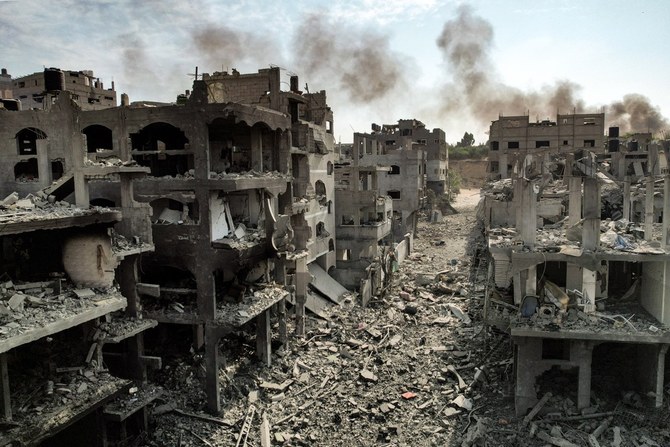
- Aid groups warn any invasion would add to already-catastrophic conditions for civilians
- Government spokesman says Israel ‘moving ahead’ with its operation to go after Hamas in Rafah
GAZA STRIP, Palestinian Territories: Palestinians on Thursday mourned over people killed in Israeli bombardment of Rafah, the southern Gaza city where Israel says it is advancing plans for a ground invasion.
Global concern has mounted over the looming operation against Hamas militants in Rafah, where much of Gaza’s population has sought refuge from more than six months of war in the narrow coastal strip.
Aid groups warn any invasion would add to already-catastrophic conditions for civilians.
Israeli officials have for more than two months vowed to enter Rafah, near the Egyptian border, but even before any ground operation the area has been regularly bombed, including overnight Wednesday-Thursday.
At the city’s Al-Najjar Hospital on Thursday, two men knelt in front of a white body bag in grief, among other mourners gathered at the site.
Elsewhere in the city, Palestinians tried to salvage belongings from the rubble of bombarded buildings.
Israeli government spokesman David Mencer said Israel was “moving ahead” with its operation to go after four Hamas battalions in Rafah.
“They will be attacked,” he said.
The war began with an unprecedented Hamas attack on October 7 that resulted in the deaths of about 1,170 people in Israel, according to an AFP tally of Israeli official figures.
Israel vowed to destroy Hamas, with a retaliatory offensive that has killed at least 34,305 people in Gaza, mostly women and children, according to the Hamas-run territory’s health ministry.
Thursday’s toll included at least 43 more deaths over the previous day.
During their attack militants seized hostages, 129 of whom Israel estimates remain in Gaza, a figure that includes 34 presumed dead.
Hamas on Wednesday released a video of an Israeli-American man who was one of those captured.
Also on Wednesday, US President Joe Biden signed a law authorizing $13 billion in additional military aid to close ally Israel.
Much of that funding is to support the country’s air defenses, which received an unprecedented test this month with Iran’s first-ever direct strike against its foe.
Iran fired more than 300 drones and missiles toward Israel, the Israeli military said, but most were shot down by that country and its allies.
The Iranian barrage followed what it said was a deadly Israeli strike against Tehran’s embassy consular annex in Syria.
The US legislation also included $1 billion in humanitarian aid for Gaza, with Biden demanding it reaches reach Palestinians “without delay.”
The United Nations has warned of imminent famine and “access constraints” on the delivery of humanitarian assistance.
Germany said it would resume cooperation with the main aid agency in Gaza, the UN’s agency for Palestine refugees, or UNRWA, after an independent review found Israel had not yet provided evidence for its allegations that its staff belonged to “terrorist” groups.
Regional tensions remain high as the Gaza war has led to violence between Israel and Iran’s proxies and allies.
Israel has struck increasingly deeper into Lebanon, while the Iran-backed Hezbollah movement has stepped up rocket fire and drone attacks on Israeli military bases across the border.
The violence has fueled fears of all-out conflict between Hezbollah and Israel, which last went to war in 2006.
On Thursday Lebanese state media and a Hezbollah source said one person was wounded in an Israeli drone attack on a fuel truck near Baalbek, the latest such incident away from the southern border.
In other regional fallout, US-led coalition forces shot down an anti-ship missile launched by Yemen’s Iran-backed Houthi rebels, American authorities said on Thursday.
The Israeli military on Thursday said its aircraft had struck more than 30 Hamas targets across Gaza over the previous day.
Witnesses reported clashes between militants and Israeli troops near the Nuseirat refugee camp in central Gaza, as the world’s attention is increasingly focused further south, on Rafah.
Netanyahu in early April gave no details but said “there is a date” for the Rafah operation, over which the United States and others have expressed grave concern because of the concentration of civilians there.
Citing Egyptian officials briefed on Israeli plans, The Wall Street Journal has said Israel was planning to move civilians to nearby Khan Yunis over a period of two to three weeks, before gradually sending in troops.
The hostage in the video released on Hamas’s official Telegram account identified himself as Hersh Goldberg-Polin, 23.
In the video, the authenticity of which AFP has not been able to independently verify, Goldberg-Polin was missing a hand, a wound he suffered during his capture.
In an apparent reference to Jewish Passover which began this week, Goldberg-Polin, likely speaking under duress, told Israeli government members that “while you sit and have holiday meals with your families, think of us, the hostages, who are still here in hell.”
Hostage supporters and anti-government demonstrators have intensified protests — including again on Wednesday night in Jerusalem — for the government to reach a deal that would free the captives, accusing Netanyahu of prolonging the war.
The European Union, the UN rights office and the White House have called for a probe into mass graves found at Gaza’s two biggest hospitals after Israeli raids.
“We want answers,” US National Security Adviser Jake Sullivan said on Wednesday. “We want to see this thoroughly and transparently investigated.”
Israel has repeatedly targeted hospitals during the war, accusing Hamas of using them as command centers and to hold hostages. Hamas denies the accusations.
Gaza’s Civil Defense agency said nearly 340 bodies were uncovered at Nasser Hospital in Khan Yunis city.
Israeli army spokesman Major Nadav Shoshani said on X that “the grave in question was dug — by Gazans — a few months ago.”
The Israeli army acknowledged that “corpses buried by Palestinians” had been examined by soldiers searching for hostages, but did not directly address allegations that Israeli troops were behind the killings.



